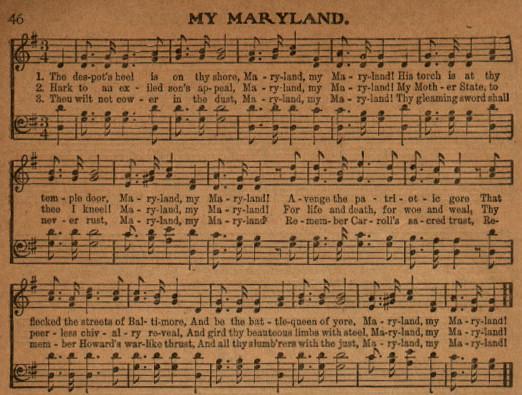What are they waiting for? Change the Maryland state song
October 23, 2015
Local and state officials all across the country are moving to change government-sponsored symbols that have ties to the Confederacy and, by implication, to racism. The catalyst for these changes was the shooting of nine people in the Emanuel African Methodist Episcopal Church in Charleston, North Carolina, by a teenager who was motivated by white supremacist ideals. A debate has been sparked about the political correctness of Confederate symbols.
There is no question that racism is real and pervasive, but what is racist and what’s not? In Maryland the debate has turned, for the sixth time, to the state song. State Representative Karen Lewis Young (D), from Frederick, is now spearheading a bill to change the state song. Is this an important issue? Even though I couldn’t find anyone who knows what the state song is (or could hum a few bars), still, I think it’s an important issue for yesterday and today. It’s far more important than re-naming a street.
This issue is being reintroduced today; clearly the song is controversial; and many have questioned it in the past.
“If you closely examine the history, what was going on at the time the [original state] song was written, who the author was, what his background was, you will see it is very biased,” Young said.
Young has a point. The state song was written in 1861 by Maryland native and Confederate sympathizer James Ryder Randall in response to a clash between Union soldiers and Confederate demonstrators in Baltimore, April 1861.
Surprisingly, the state song wasn’t officially ratified until 1939, 78 years after the Civil War was over, which also happened to be during the height of Jim Crow laws and racism in the United States. This fact strongly implies that lawmakers approved of the racial discrimination.
The song lyrics refer to “Northern scum” and calls for the assassination of President Abraham Lincoln and includes 12 other references to the preservation of slavery.
Maryland has a long history of conflict because it was an occupied state during the Civil War, and after the war, for more than 50 years, the leadership of the state vacillated between segregation and anti-segregation sentiment, leading to changes in the Maryland Constitution.
The Constitution of the State has been amended many times. Nobody wants to change that document today– we want to change the song.
Are people offended by the song? Yes. According to the president of the Frederick County National Association for the Advancement of Colored People (NAACP), Guy Djoken, in an article published by the Frederick News Post, the song makes people feel uncomfortable, he fully supports a change.
According to a Baltimore Sun poll , a majority of people still do not want the change, but nearly 30% of respondents do support a change. I think more people would support adopting different lyrics if they understood the whole issue.
Delegate Young has submitted a change to the state song, a poem of the same title, “Maryland, My Maryland” written by John T. White in 1894. White’s poem is a celebration of the beauty of Maryland instead of a divisive call to arms like Randall’s poem.
So why aren’t lawmakers supporting a change?
According to Young the opposition argues that a hypersensitivity to offending people, not a loss of compassion, is ruining the political discussion across the country. I don’t agree with the opponent’s reasoning. Nobody is arguing to ban the song, just take it out of state sponsorship.
Besides, isn’t it the job of the government to be as fair and non-biased as possible? Private citizens should be (and are) allowed to say almost whatever they want; that’s their Constitutional right, but government should be a bias-free institution. That’s why we have separation of Church and State.
Perhaps a larger question is, why aren’t lawmakers just compromising and making the change? Young’s proposed song is titled the same, sung to the same tune and isn’t controversial. If lawmakers can’t make seemingly easy changes such as this, how can we trust them to make more important and difficult decisions?
In the Frederick News Post State Representative Michael Hough (R) argues that such a bill would waste valuable time. However, according to Young, she has spent very little time on the proposed bill and I would hope that a debate on the State song would be brief.
So what is the real reason? I believe it’s the ever looming threat of losing their next election. Government officials are viewed as weak in today’s political atmosphere if they change their views or compromise. This is paired with the fact that many people in Maryland still support the Southern point of view and/or believe that any government decision is an invasion of their way of life.
Changing the state song is a step towards a more tolerant society. I am deeply saddened that for the sixth time a change has been introduced and, probably, will fail. If lawmakers can’t change something this simple, then perhaps we are doomed as a democracy.



